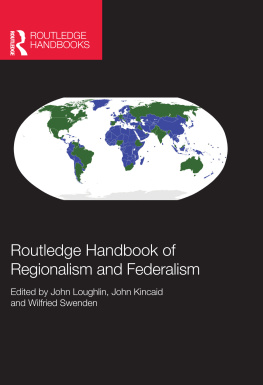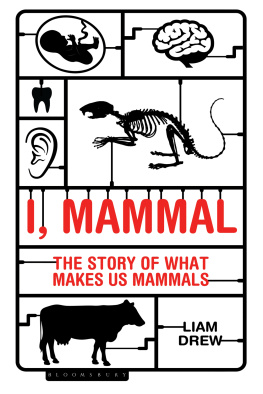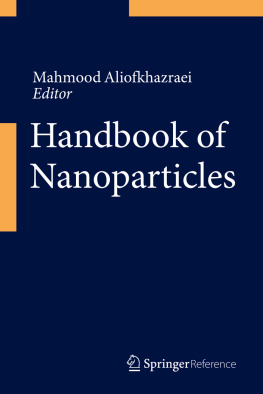Brudzynski - Handbook of Mammalian Vocalization
Here you can read online Brudzynski - Handbook of Mammalian Vocalization full text of the book (entire story) in english for free. Download pdf and epub, get meaning, cover and reviews about this ebook. year: 2010, publisher: Elsevier Science, genre: Romance novel. Description of the work, (preface) as well as reviews are available. Best literature library LitArk.com created for fans of good reading and offers a wide selection of genres:
Romance novel
Science fiction
Adventure
Detective
Science
History
Home and family
Prose
Art
Politics
Computer
Non-fiction
Religion
Business
Children
Humor
Choose a favorite category and find really read worthwhile books. Enjoy immersion in the world of imagination, feel the emotions of the characters or learn something new for yourself, make an fascinating discovery.

- Book:Handbook of Mammalian Vocalization
- Author:
- Publisher:Elsevier Science
- Genre:
- Year:2010
- Rating:4 / 5
- Favourites:Add to favourites
- Your mark:
- 80
- 1
- 2
- 3
- 4
- 5
Handbook of Mammalian Vocalization: summary, description and annotation
We offer to read an annotation, description, summary or preface (depends on what the author of the book "Handbook of Mammalian Vocalization" wrote himself). If you haven't found the necessary information about the book — write in the comments, we will try to find it.
Handbook of Mammalian Vocalization — read online for free the complete book (whole text) full work
Below is the text of the book, divided by pages. System saving the place of the last page read, allows you to conveniently read the book "Handbook of Mammalian Vocalization" online for free, without having to search again every time where you left off. Put a bookmark, and you can go to the page where you finished reading at any time.
Font size:
Interval:
Bookmark:
HANDBOOK OF MAMMALIAN VOCALIZATION
AN INTEGRATIVE NEUROSCIENCE APPROACH
AN INTEGRATIVE NEUROSCIENCE APPROACH
Edited by
STEFAN M. BRUDZYNSKI

Academic Press is an imprint of Elsevier
32 Jamestown Road, London NW1 7BY, UK
30 Corporate Drive, Suite 400, Burlington, MA 01803, USA
525 B Street, Suite 1900, San Diego, CA 92101-4495, USA
First edition 2010
Copyright 2010 Elsevier BV. All rights reserved
No part of this publication may be reproduced, stored in a retrieval system or transmitted in any form or by any means electronic, mechanical, photocopying, recording or otherwise without the prior written permission of the publisher. Permissions may be sought directly from Elseviers Science & Technology Rights Department in Oxford, UK: phone (+44) (0) 1865 843830; fax (+44) (0) 1865 853333; email: for further information
Notice
No responsibility is assumed by the publisher for any injury and/or damage to persons or property as a matter of products liability, negligence or otherwise, or from any use or operation of any methods, products, instructions or ideas contained in the material herein. Because of rapid advances in the medical sciences, in particular, independent verification of diagnoses and drug dosages should be made
British Library Cataloguing-in-Publication Data
A catalogue record for this book is available from the British Library
Library of Congress Cataloging-in-Publication Data
A catalog record for this book is available from the Library of Congress
ISBN: 978-0-12-374593-4
For information on all Academic Press publications
visit our website at elsevierdirect.com
Typeset by Macmillan Publishing Solutions
www.macmillansolutions.com
Printed and bound in United States of America
10 11 12 13 14 15 10 9 8 7 6 5 4 3 2 1

Stefan M. Brudzynski
Joseph F.Y. Hoh
John D. Newman
Myron A. Hofer
Alanna Maltby, Kate E. Jones and Gareth Jones
Neville H. Fletcher
Michael Garstang
Stefan M. Brudzynski and Neville H. Fletcher
Gillian D. Sales
Maria Luisa Scattoni and Igor Branchi
Josef Syka
Markus Whr and Rainer K.W. Schwarting
Gnter Ehret and Simone Kurt
Christopher I. Petkov, Christoph Kayser and Nikos K. Logothetis
Yoav Litvin, D. Caroline Blanchard and Robert J. Blanchard
Markus Whr, Diego Oddi and Francesca R. DAmato
Koji Kuraoka and Katsuki Nakamura
Drew Rendall and Michael J. Owren
Sophie K. Scott, Disa Sauter and Carolyn McGettigan
Jaak Panksepp
Jeffrey Burgdorf and Joseph R. Moskal
Elke Zimmermann
Jeff Muller, Susan Brunelli and Harry Shair
Allan Siegel, Suresh Bhatt, Rekha Bhatt and Steven S. Zalcman
Steven W. Porges and Gregory F. Lewis
Stefan M. Brudzynski
George S. Borszcz and Catherine A. Spuz
Francisco Gonzalez-Lima
John G. Nyby
Eva Gruber-Dujardin
Steffen R. Hage
Steffen R. Hage
Steven M. Barlow, James P. Lund, Meredith Estep and Arlette Kolta
Keisuke Shiba
Michael Smotherman, Christine Schwartz and Walter Metzner
Hanjun Liu, Roozbeh Behroozmand and Charles R. Larson
Walter Metzner and Gerd Schuller
Gerald S. Berke and Jennifer L. Long
Camille Finck and Lionel Lejeune
Roland Frey and Alban Gebler
Joy S. Reidenberg and Jeffrey T. Laitman
Eva Maria Eberl
Marta B. Manser
Yale E. Cohen, Jung Hoon Lee, Joji Tsunada and Brian E. Russ
Ari Daniel Shapiro
Klaus Zuberbhler
Steven M. Barlow, Ph.D., speech physiologist, neuroscientist and Professor of Speech-Language-Hearing, Neuroscience, Human Biology, and Bioengineering at the University of Kansas. He works on the central patterning of ororhythmic and respiratory movements in preterm and term infants at risk for neurodevelopmental outcome, and has engineered a new orocutaneous entrainment system undergoing randomized clinical trials for the prohabilitation of suck and feeding disorders in premature infants.
Roozbeh Behroozmand received his BSc degree from the Department of Electrical and Computer Engineering at the University of Tehran. He received the MSc degree in Biomedical Engineering at Amirkabir University of Technology. He is currently a Ph.D. student in the Department of Communication Sciences and Disorders at Northwestern University, Evanston, Illinois, USA. His primary research interest is focused on neural processing of speech and hearing, audiovocal integration, speech motor control and biomedical signal processing.
Gerald Berke, MD, laryngeal physiologist, otolaryngologist, head and neck surgeon. Presently, Professor of Surgery and Chief of the Division of Head & Neck Surgery at the University of California Los Angeles and Director of the UCLA Voice Center for Medicine and the Arts. He is a member of the Board of Directors of the American Board of Otolaryngology and a past President of the American Laryngology Association. He is clinically involved with patients with voice disorders, nasal and sinus diseases and esophagal disorders and is currently working on requirements for organ and nerve preservation for laryngeal transplantation in humans and measures of laryngeal function.
Rekha Bhatt, Ph.D., Research Associate in the Department of Neurology and Neuroscience, UMD-New Jersey, New Jersey Medical School, Newark New Jersey, USA. Research interest: neurobiology of aggressive behavior; neuroimmunology.
Suresh Bhatt, DVM, Research Associate in the Department of Neurology & Neuroscience, UMD-New Jersey, New Jersey Medical School, Newark New Jersey, USA. Research interest: neurobiology of aggressive behavior.
D. Caroline Blanchard, Ph.D., biopsychologist and ethologist, Research Professor, Pacific Biosciences Research Center, and Professor, Department of Genetics and Molecular Biology, John A. Burns School of Medicine, University of Hawaii at Manoa, Honolulu, Hawaii, USA. Her main research interest is in aggression, defense and social behaviors in mammals, and the brain systems that support these patterns.
Robert J. Blanchard, Ph.D., biopsychologist and ethologist, Professor of Psychology and Neuroscience at the University of Hawaii at Manoa, Honolulu, Hawaii, USA. His main research interest is in aggression, defense, and social behaviors in mammals, and the brain systems that support these patterns.
George S. Borszcz, Ph.D., behavioral neuroscientist, Associate Professor of Behavioral and Cognitive Neuroscience in the Department of Psychology at Wayne State University, Detroit, Michigan, USA. His main research interest is in the neurobiology of pain processing and analgesia, and particularly the brain circuitry responsible for the affective response to pain.
Igor Branchi, Ph.D., neuroscientist and psychobiologist, Researcher at the Department of Cell Biology and Neuroscience, Istituto Superiore di Sanit, Rome, Italy. His major field of interest is the role of genetic and epigenetic factors in shaping neurobehavioral development and adult vulnerability to mental dysfunction.
Stefan M. Brudzynski, Ph.D., D.Sc., neurophysiologist, neuroscientist and biopsychologist, presently Professor of Psychology and Neuroscience at Brock University, St. Catharines, Ontario, Canada. His main research interest is in neural substrate of animal behavior, neuropsychopharmacology, control of locomotor behavior, vocal communication in animals, and particularly central control of ultrasonic vocalization and communication in rodents.
Next pageFont size:
Interval:
Bookmark:
Similar books «Handbook of Mammalian Vocalization»
Look at similar books to Handbook of Mammalian Vocalization. We have selected literature similar in name and meaning in the hope of providing readers with more options to find new, interesting, not yet read works.
Discussion, reviews of the book Handbook of Mammalian Vocalization and just readers' own opinions. Leave your comments, write what you think about the work, its meaning or the main characters. Specify what exactly you liked and what you didn't like, and why you think so.










